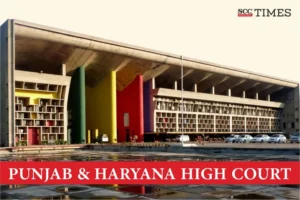Punjab and Haryana High Court: In a writ petition filed by the petitioner seeking relief regarding his non-appointment as a Civil Judge due to his failing the exam by 6.75 marks, the Division Bench of Sheel Nagu*, CJ., and Sudhir Singh, J., dismissed the petition while holding that the petitioner entered the process of recruitment with open eyes and was well aware of the passing marks, thus, the principle of estoppel would operate against him. The Court also held that it was valid to exceed the 15% limit for viva voce as the broader purpose of evaluating a candidate’s suitability for a judicial position required a more nuanced approach.!
Background
The petitioner was a judiciary aspirant who applied for appointment as a Civil Judge (Entry Level) under an advertisement issued by the Haryana Public Service Commission. He was aggrieved that despite scoring 513.50 marks out of 900 marks in the written (main) examination and securing 29.75 marks out of 200 marks in viva voce, he could not pass the exam by a margin of 6.75 marks as he secured 543.25 out of the requisite 550 marks. Thus, he filed the present writ petition.
Analysis
The Court opined that the petitioner entered the process of recruitment with open eyes and was well aware of the passing marks being 50 percent aggregate of the written as well as viva-voce and, therefore, it could not be said that he was taken by surprise or the rules of the game were changed after the game had begun. Thus, the principle of estoppel would operate against an unsuccessful candidate.
Regarding the expectation of a candidate, the Court stated that undoubtedly every candidate does his best but that alone could not be a good reason to interfere if a candidate failed to secure marks as per their expectations. The Court added that it was only because the petitioner secured 29.75 marks out of 200 marks in the viva voce that he could not attain the passing marks of 50 percent aggregate marks of the written exam and viva voce. Thus, the Court held that the petitioner could not be granted any relief.
The Court further stated that in matters of recruitment to services, interference in the recruitment process, when otherwise conducted in a transparent, fair, and reasonable manner with no allegation of malafides, could not be done in the limited power of judicial review of this Court under Article 226 of the Constitution.
The Court said that “Recruitment to judicial service is not akin to recruitment to any civil post under the State or UOI. The unique nature of duties and powers attached to a judicial office compels the recruiting agency to adopt a mode of selection which is understandably distinct. Emphasis upon viva voce to a little more extent than other recruitments, is necessary to ensure, that persons of very high level of integrity, aptitude, character, and merit, adorn the judicial offices. Whether a candidate has an aptitude, inclination, and character to become a judge, cannot alone be determined by written test.” Stating this, the Court added that the requirement of a percentage of marks little higher than 15% for viva voce, as stipulated by the Supreme Court in Ajay Hasia v. Khalid Mujib Sehravardi (1981) 1 SCC 722, in the recruitment of judicial offices was understandable. In this regard, the Court also placed reliance on the case Lila Dhar v. State of Rajasthan (1981) 4 SCC 159.
In light of the above, the Court held that it was valid to exceed the 15% limit for viva voce as the broader purpose of evaluating candidate’s suitability for a judicial position required a more nuanced approach. Thus, adhering strictly to the 15% cap was not obligatory in such cases.
Holding the aforesaid, the Court dismissed the writ petition.
[Bhuvan Goel v. High Court of Punjab and Haryana, 2025 SCC OnLine P&H 246, decided on 09-01-2025]
*Judgment authored by Chief Justice Sheel Nagu
Advocates who appeared in this case:
For the petitioner: Nayandeep Rana
For the respondents: Senior Advocate Sanjeev Sharma, Shubreet Kaur Saron, and Balvinder Sangwan


